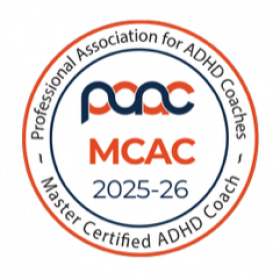In a coaching session with a client a few days ago, I came up against the concept of making mistakes as a person with ADHD and it inspired a lot of thoughts in me. If you are a person with ADHD, your mistakes are to you what alcoholism is to an alcoholic; even if you have not made a mistake in quite some time, it’s like the potential to mess something up is always lurking there, in the shadows, a demon that could rear its ugly head in your life at any time if not regarded with total vigilance 24/7. On an otherwise perfect day, when you think you have taken care of all the administrative details of your life, it could cause everything to come crashing down around you; an unpaid-and-forgotten-about bill, a forgotten-but-very-important date or anniversary, a tiny detail that you overlooked, or in my case once, an apple I had forgotten in the bottom of a new purse that degraded into disgusting smelling mush that ruined all my possessions in said purse and which I stuck my hand into.
Neurotypical people usually do not understand the relationship we have to our mistakes, or that these mistakes can often look like carelessness to others despite our best efforts. What non-ADHD people often don’t understand is that we can try so hard and still make a mistake so simple that it is beyond explanation. There are simply no words to explain how you thought you’d taken everything into account and missed an obvious error right in front of your eyes. Every person with ADHD knows that look on the face of others, be it your boss, your partner, your parent or a friend…that look that says, “what are you, a fucking idiot?”
We wear each and every one of our mistakes like invisible scars. I can still remember the look on my mom’s face when I was once carrying out the garbage and I dropped a heavy trash bag on her foot because I wasn’t paying attention to what I was doing, and I was rushing. When I was 10 and I was on a dock in the river looking down into the water and my glasses fell off my face and were carried away by the rushing waters and I had to admit to my dad that I needed new glasses right then and there. The time I was getting on a flight and I absentmindedly stuck my boarding pass into my backpack, which I then checked, and missed my flight because in a panic I could not find my boarding pass when it came time to get on the plane. The time I ordered more than $600 of the wrong product at my job as a liquor store manager because I didn’t check a code closely enough. The time we went on vacation and I left my entire suitcase sitting on my bed at home as a child and my mom had to pay to have it shipped to us. The time I took our beloved pet bird to work and didn’t check to make sure the cage was closed properly, and as I brought her out of the car to take her inside she flew away, devastating my husband and causing a three-day-long delirious frenzy of nonstop searching. The time I set a building on fire because I wasn’t paying attention to the kettle I turned on for tea. The list goes on and on. Every person with ADHD has a list like this, has a storeroom of memories in their body of what it feels like to make a mistake, what it feels like to see that look on the face of another.
It is no surprise, then, that we are terrified of our mistakes, and the result of this terror manifests itself in many ways. In perfectionism that borders on procrastination; planning and planning the perfect plan without taking any action. In defensiveness and never being able to admit we were wrong; blaming others, refusing to take accountability, deflecting. In self-sabotage; not even bothering to try because we are so sure we’ll fail. As a person with ADHD and a coach, I’ve seen many faces of what the intimate familiarity with a lifetime of mistakes looks like.
We are powerless against making mistakes. They are going to happen and there is nothing we can do about it. Sure, you can take measures to try and do your best and to be thorough, focused, present and to reduce errors as much as you can. But at the end of the day, a person with ADHD is going to make mistakes. No amount of avoidance, fear, or denial can stop mistakes from happening, and in fact, it is my belief that the harder we fight against the idea that our futures contain mistakes, the more likely it is that we’ll make them.
So what’s a person with ADHD to do? Here’s my take:
Step #1: Realize that it’s probably not as bad as you think it is, and even if it is, that this too shall pass: Fear of making mistakes is like a fear of anything – it’s often worse than the actual event itself. I have been arachnaphobic my entire life and my greatest fear centred on the idea that a spider would crawl on me or into my mouth as I slept. When I was 24, I cleaned my bedroom and rearranaged the covers on my bed only to encounter the biggest spider I have ever seen on the Northwest Coast in my sheets. It was, and I do not exaggerate, the size of a hockey puck. It was one of the worst moments of my life. But it happened and its and I lived to tell the tale and in fact, I’m quite a bit less afraid of spiders now that the absolute most terrible thing that could have happened, has happened. With ADHD, there is an insensitivity to time – everything is either ‘now’ or ‘not now’. If you have to live in the unavoidable truth that you have profoundly and royally fucked something right up, it is a terrible feeling, but that feeling is much compounded by a sense that this feeling is never going to end. We forget to remember that as terrible as this moment is, as awful as it feels – to admit to your mother that you forgot her birthday, or to your partner that you didn’t book that flight that was on sale when they asked you to and now the price has more than doubled, or to your boss that you didn’t submit that report on time – that this moment is going to end and that you are not going to feel this bad forever. Even if your mother is super mad at you and doesn’t speak to you for a month. Even if your partner is angry and you end up having to pay $600 more than you would have. Even if you get fired. You are not going to feel this bad forever. Things are going to get better and this moment is going to pass. And most of the time, the mistakes we make do not carry as dire consequences as these – we just stress out about them as if they do. Most of the time, the result of our mistakes are that someone is a little miffed, or possibly even that we only just let ourselves down and nobody else even noticed, yet we stress ourselves out as if every slip-up we make is the worst thing that has ever happened to anybody. Accept that sometimes, despite your best efforts, mistakes are going to happen as they happen to everyone. Most of the time, it’s not the end of the world even if someone is a little mad at you. Occasionally it’s going to be a pretty big fuck-up, but time heals all wounds, and as the days, months and years go by, you will heal from the embarrassment or pain caused by this mistake.
Step #2: Forgive yourself
All people – neurotypical and neurodiverse alike – make mistakes, but it is most important for us as people with ADHD to treat ourselves with compassion, be gentle with ourselves and forgive ourselves. Really knowing and accepting that sometimes you’re going to make a mistake despite your best effort can either paralyze you with fear or it can put you in a state of zen acceptance. If you believe that your mistake defines you as a person, that it impacts your value and your worth, you will likely be paralyzed. If you can separate yourself from your mistakes, if you can treat yourself as a person worthy of love, respect and forgiveness despite the occasional goof, you’ll be able to start taking your mistakes in stride. It is so important – I cannot stress enough – SO important that we learn to love and forgive ourselves, because sometimes other people can’t. People who give you the “are you a fucking idiot” look have no idea how hard we’ve worked to get where we are, how much heart and courage and bravery it may have taken just to get out of bed that morning. But you do! You were there. You know exactly how hard you’ve worked and how far you’ve come, and how much more potential you have. ADHD’ers are so often their own biggest critics and worst enemies. As a coach, if I accomplish only one thing with a client, let it be to help them learn to love and be gentle with themselves. From this one action stems almost all the other actions that I help people accomplish. Being able to own a mistake means really learning from a mistake in a way that can’t happen when you’re blaming others, being defensive, or writing yourself off as a total piece of shit. That’s a cop out, a way to avoid the scary work of growth and change, and it’s where we like to hide for safety. Much more difficult is the middle path of being able to look at a mistake, take ownership and do what needs to be done to fix it, without letting that completely and utterly crush us.
It isn’t easy, but like any habit, it can be learned and it’s worth it. You are not defined by your mistakes, but you are going to make them, so you’d better get used to it and learn how not to let it destroy you.

